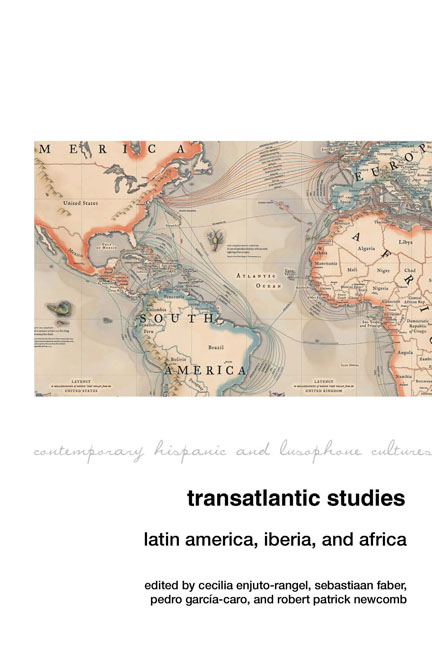Book contents
- Frontmatter
- Contents
- Introduction: Transatlantic Studies: Staking Out the Field
- Transatlantic Methodologies
- Transatlantic Linguistic Debates
- Transatlantic Displacement
- Transatlantic Memory
- Transatlantic Postcolonial Affinities
- Transatlantic Influence
- Epilogue: The Futureâif There Is OneâIs Transatlantic
- Index
14 - Luis Cernuda's “Historial de un libro”: A Travelogue
- Frontmatter
- Contents
- Introduction: Transatlantic Studies: Staking Out the Field
- Transatlantic Methodologies
- Transatlantic Linguistic Debates
- Transatlantic Displacement
- Transatlantic Memory
- Transatlantic Postcolonial Affinities
- Transatlantic Influence
- Epilogue: The Futureâif There Is OneâIs Transatlantic
- Index
Summary
A Split: The Man and the Poet
Once somewhat familiar with Luis Cernuda (Seville 1902–Mexico City 1963), his work, and commentary on it, the contemporary reader cannot but observe two salient facts: the critical consensus regarding the poet and his poetry since his death, and the exemplary adherence of the most authoritative readership to the poet's view of his own work and life. In this sense, not only is it true that Cernuda's desire to be a poet for the future reader—whom he took it upon himself to educate aesthetically and morally—was fulfilled, but moreover when it comes to aesthetics, contemporary scholarship takes into account the poet's opinions as expressed in his literary criticism and in “Historial de un libro,” his poetic biography. Whether it is Jaime Gil de Biedma's “El ejemplo de Luis Cernuda,” in La Caña Gris's homage (1962), Octavio Paz's influential essay “La palabra edificante” (1964), Jose Angel Valente's “Donde habite el olvido” (1993), or Antonio Gamoneda's “Luis Cernuda: el poeta y el critico” (2004), younger poets recognize in Cernuda a man who lived through his poetry and a poet who opposed conventional morality with the same boldness with which he stood by his verse and took a stand for different marginalized groups without suffering any ideological servility.
Regarding the inner duality between the poet and the man, two of Cernuda's most passionate and devoted critics, Phillip Silver and Derek Harris, although in agreement about the paramount importance of the poet's life for his work and vice versa, maintain that there is no specific hermeneutical value to the man's biography when we read and interpret his poetry. This goes hand in hand with the way critics assess Cernuda's insistence on his poetic persona (Silver 1965: 167; Harris 1992: 26; Valender 1984: 125–27; 1990, 14). Paradoxically enough, however, criticism consistently refers to the experiential background that sustains and nurtures Cernuda’s verses, and which critics believe provides the ground for the deep moral significance of his poetry. Ever since Octavio Paz characterized Cernuda’s poetry as “edificante” [edifying], critics have insisted on the existence of a moral undercurrent in his work that amalgamates world and word (Hughes 2004: 234–36; Muñoz 2004: 350). In this fusion it is poetry that turns experience into consciousness (Hughes 2004: 233–34), passion into living thought (Muñoz 2004: 350), biography into spiritual history (Paz 1964: 149).
- Type
- Chapter
- Information
- Transatlantic StudiesLatin America, Iberia, and Africa, pp. 167 - 177Publisher: Liverpool University PressPrint publication year: 2019



